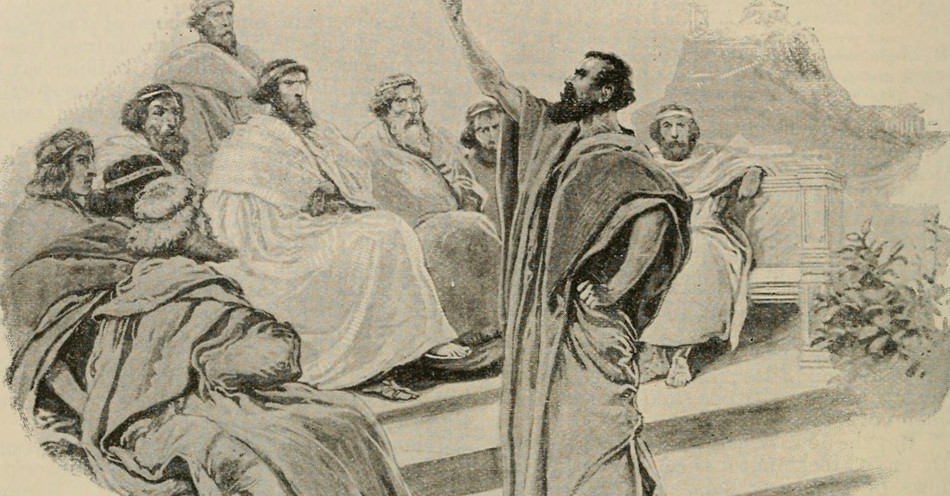Silas was one of the Apostle Paul’s most trusted allies. Unfortunately, when most of us hear him mentioned in the Bible, we think, “Oh yeah, that guy was there too,” and then forget about him.
Who was Silas, and what can we learn from his life?
When Did Silas Join Paul on His Missionary Work?
Before their missionary travels, Silas traveled with Paul for a different kind of mission. A group in Antioch had started teaching that gentile believers needed to be circumcised and follow the law of Moses. In response, the church in Jerusalem sent four men—including Paul and Silas—as official church representatives to clear up the confusion in Antioch (Acts 15:1-35).
Paul and Silas likely built their friendship on this journey to Antioch. Shortly after, Paul asked Silas to be his partner in ministry during his second missionary journey, 49-51 AD (Acts 15:36-41).
Where Do We See Silas in the Bible?
Acts 15 offers our introduction to Silas, where we learn several things about him:
- Silas was one of the official leaders of the church in Jerusalem (verses 22 and 25-27)
- Silas had the gift of prophecy (verse 32)
- Paul specifically chose Silas to be his partner in ministry (verses 36-41)
The next few chapters of Acts share the details of Paul and Silas’s travels. Some of these highlights include:
- Meeting Timothy and recruiting him to join them (Acts 16:1-4)
- Leading Lydia and her household to Christ (Acts 16:14-15)
- Paul casting a demon out of a slave girl who told fortunes (Acts 16:16-18)
- Paul and Silas being beaten and imprisoned at the demand of the slave girl’s angry owners (Acts 16:18-24)
- Paul, Silas, and Timothy getting chased out of Thessalonica by an angry mob (Acts 17:5-10)
- Paul getting chased out of Berea by this same angry mob while Silas and Timothy stayed behind (Acts 17:13-15)
- Paul, Silas, and Timothy meeting up again in Corinth, where Paul preached for a year and a half (Acts 18:5)
We know that sometime after meeting in Corinth, Silas stopped traveling with Paul, since during Paul’s trip to Greece in Acts 20, Silas isn’t listed among the people traveling with Paul (Acts 20:4-5). However, this is not the last time Silas is mentioned in Scripture. In 2 Corinthians, 1 Thessalonians, 2 Thessalonians, and 1 Peter, Silas is mentioned under a different name—Silvanus.
Scholars believe the names Silas and Silvanus refer to the same person, similar to how the Apostle Paul is known by his Greek name (Paul) more than his Hebrew name (Saul). In this case, Silas would be the Greek version, and Silvanus would be the Latin version of his name.
We get clear confirmations of this by reading the context. For instance, in 2 Corinthians 1:19, Paul mentions how he, Silvanus, and Timothy preached about Jesus to the Corinthians. In both letters to the Thessalonians, Silvanus is also listed with Paul and Timothy as the senders of the letter (1 Thessalonians 1:1, 2 Thessalonians 1:1). All this matches nicely with how Acts describes the travels of Paul, Silas, and Timothy.
In light of this, some Bible versions translate “Silvanus” to “Silas” for clarity and mention the original Greek in a footnote.
The last mention we have of Silas/Silvanus is in 1 Peter 5:12, where Peter mentions that he wrote the letter with the help of Silvanus, “a faithful brother.” From this, we can gather that Silas remained an important leader in the church for at least a decade after he traveled with Paul.
What Are Some Churches that Silas Would Have Helped Plant?
Silas was instrumental in planting the churches in Philippi (Acts 16:11-40), Thessalonica (Acts 17:1-4), Berea (Acts 17:10-15), and Corinth (Acts 18:1-17). Of these four, Berea and Corinth deserve special mention.
After Paul, Silas, and Timothy were driven out of Thessalonica by the angry mob, they went to Berea next. The Bereans received the gospel much better than the Thessalonians and enthusiastically studied Scripture. Unfortunately, the angry Thessalonian mob followed after the missionaries. Paul was particularly hated since he had been the main speaker and the one who had cast the demon out of the slave girl (see Acts 16:16-18). Thus, for his safety, Paul was escorted to Athens by some Berean believers.
But without Paul, who would teach and train the fledgling Berean church? This was where Silas stepped up. With the help of young Timothy, Silas trained up Berean leaders so the church could grow firm roots.
A second church of particular note is Corinth. Silas spent many months in Corinth while Paul was preaching there, and Silas may have stayed even after Paul left, since Corinth is the last known place they were together. Legend says that Silas became the bishop of Corinth, but this is a rumor from long after the fact and is hard to verify. In any case, we know Silas played an important role in the Corinthian church.
The Bible doesn’t tell us how Silas died, and again, history offers only rumors. It is thought that Silas died in Macedonia sometime before the end of the first century.
What Can We Learn from Silas?
Paul may have been the most influential leader of the early church, both through his ministry and through his letters we still read today. Others would argue Peter was the most influential. After all, Peter was the primary speaker at Pentecost. God used Peter to initiate bringing Gentiles into the church, and Peter continued to play an important leadership role in the early church.
In contrast, Silas is known as “that guy who worked with Paul and Peter.”
In some ways, this makes Silas seem insignificant—but take a moment to think about that. Silas was one of the closest and most trusted companions of two of the greatest heroes the church has ever known. Silas was a man they could count on whenever these leaders needed something done right.
The Jerusalem church chose Silas as their official representative. Paul chose Silas to be his right-hand man on his second missionary journey. Paul was comfortable leaving Berea because he knew he could count on Silas to establish the Berean church without him. Peter wrote 1 Peter with the help of Silas and specifically commended Silas as a “faithful brother.”
And Silas was faithful. He was content to serve wherever he was needed, whenever God called him, no matter how much persecution he had to endure.
Perhaps the most famous story we have of Silas is when he and Paul were severely beaten and thrown into prison. Their response? They sang hymns of praise to God, even as they sat behind bars, aching with the pain of their beating.
We never see Silas perform a miracle or give a grand speech in Scripture, but his actions speak loud and clear. He helped lay a foundation for the church that we are standing on to this very day.
So, what does that mean for us?
Not everyone can be a Paul or a Peter. And not everyone should be. The body of Christ is made of different parts that play different roles—and without each part, the body would be incomplete. Perhaps the way Paul puts it in 1 Corinthians 12:21-22 describes Silas best.
“The eye cannot say to the hand, ‘I have no need of you,’ nor again the head to the feet, ‘I have no need of you.’ On the contrary, the parts of the body that seem to be weaker are indispensable...”
Maybe you feel like you’re playing a background role to a Paul or a Peter. This is an honorable and important way to serve Christ! Whether you are recognized for your efforts now or not, stay trustworthy. Stay faithful. Like Silas, your work behind the scenes may prove indispensable to the body of Christ.
Photo Credit: Public Domain via Flickr
This article is part of our Bible resource for understanding the significance and meaning of biblical phrases and ideas. Here are our most popular Bible articles to grow in your knowledge of God's Word:
Promises of God in the Bible
Is "This Too Shall Pass" in the Bible?
What Was the Ark of the Covenant?
Top 10 Bible Stories for Kids
“Iron Sharpens Iron” in Proverbs 27:17
"Fearfully and Wonderfully Made" in Psalm 139
“Be Still and Know That I am God” in Psalm 46:10
"No Weapon Formed Against Me Shall Prosper" - Isaiah 54:17





.jpg)